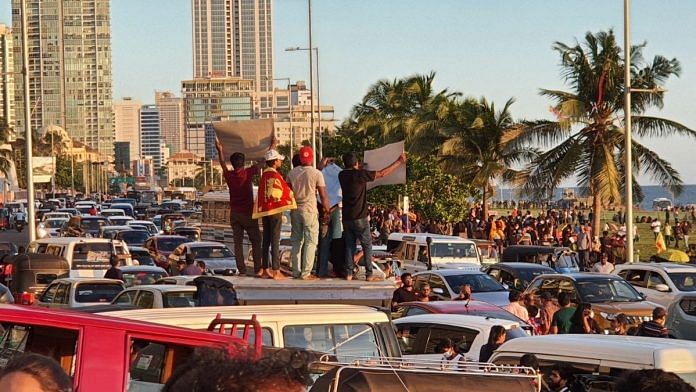Thank you dear subscribers, we are overwhelmed with your response.
Your Turn is a unique section from ThePrint featuring points of view from its subscribers. If you are a subscriber, have a point of view, please send it to us. If not, do subscribe here: https://theprint.in/
The Sri Lankan Government in the past years started to spend more on welfare schemes meant for people despite not having the enough money in terms of maintaining the required fiscal deficit. As a result Sri Lanka is in an unprecedented economic crisis where weeks long protest by Sri Lankan people demanded for the resignation of the Sri Lankan President and Prime Minister. As well as the protesters asked for change in government and governance. So this economic crisis has led to a political crisis too. Crisis is now so much in grained that Sri Lanka’s coffers have dried up and it cannot afford to pay for imports.
Millions of its people are bearing the brunt of this economic meltdown with the basic goods being in short supply, power cuts are frequent, prices are soaring and the value of income is eroding. Sri Lanka has suspended payments on its international debt of more than 51 billion dollars, actively putting the country in default. For a brief period of time the stock
exchange was also suspended. Sri Lanka’s currency is the worst performing in the world. Sri Lanka has devalued the rupee and put curbs on non essential imports and almost doubled its interest rate. Sri Lanka’s economy has lost much of its tourism revenues due to the pandemic and remittances have also dried up. Over the past years Sri Lanka borrowed heavily to invest in infrastructure development such as ports, roads and railways. These projects were not high on return with respect to the cost of these development projects. So the policies of the Sri Lankan government did not result in economic growth that would be amounting to welfare of its people and at the same time paying back the foreign debt in installments. The pandemic and the Ukraine conflict did play a big role but comparatively smaller when compared to the economic mismanagement done by the Government of Sri Lanka. The main reason behind this crisis is also the shift to organic farming and tax cuts.
The ill fated attempt to rapidly switch from chemical to organic fertilizers had a negative impact on food production. This resulted in adverse impact on agricultural productivity and it is partly responsible for the food shortages that the ordinary Sri Lankan is currently facing. So the Sri Lankan Government made a series of bad choices right from tax cuts in 2019 and then distinctly the COVID-19 pandemic hit very hard. However, the decisions the government made subsequent to the pandemic particularly not doing restructuring of debt and not going to IMF, had a disastrous impact on the health of the economy. In the start of 2021, it had become clear that there was no way that Sri Lanka would be able to continue with foreign debt repayments due to the crisis with foreign exchange reserve. On the other hand Sri Lanka did not have the ability to borrow from international capital market in order to issue Eurobonds or Sovereign bonds primarily due to the pandemic and tax cuts. The Sri Lankan President has admitted to making mistakes and has said that he will correct them.
President of Sri Lanka Gotabaya Rajapaksa has said that we should have gone to the IMF much earlier. He also said that not providing agro-chemicals to farmers was also a mistake. And further he said that we will now provide fertilizers to our farmers once again. But admitting this is too little and too late, as the economy was already vulnerable because Sri Lanka’s export has not grown for many years and the tax collection was also poor.
Therefore the government should have been very careful in making economic policy, but it chose not to for example giving tax cut benefit does not make any sense when tax collection is poor. They gave this promise of tax cut benefits during elections and once they came to power they implemented it! The Sri Lankan government kept on insisting that they were not going to IMF, so essentially they waited till the last moment and then went to the IMF when people are dying of shortages. Sri Lanka’s finance minister recently started talks with the IMF. The Sri Lankan government requested the IMF help for Rapid Financing Instrument (RFI) because of the urgent funding needs, sharp commodity price rise.
The RFI will not be granted by the IMF to Sri Lanka because the debt is not at a sustainable level. So Sri Lanka will keep facing a very difficult road ahead to economic recovery. Help from India was useful to Sri Lanka till April but even the Government of India cannot do that kind of a financial waiver nor give money that the Sri Lankan government needs because it is too much!
These pieces are being published as they have been received – they have not been edited/fact-checked by ThePrint.
Also read: Chennai to Colombo: Tamil men counting $100 notes, Sri Lankans in 1-km line to refill petrol

